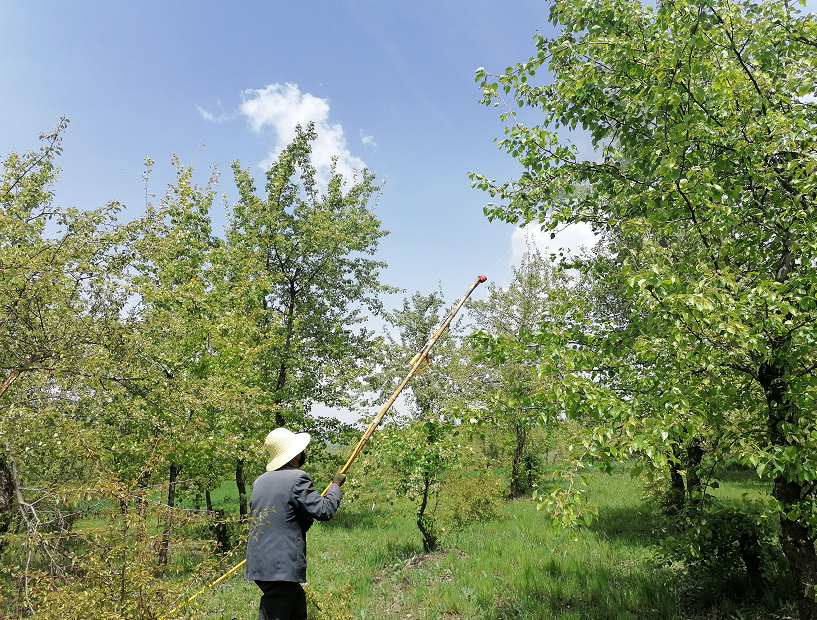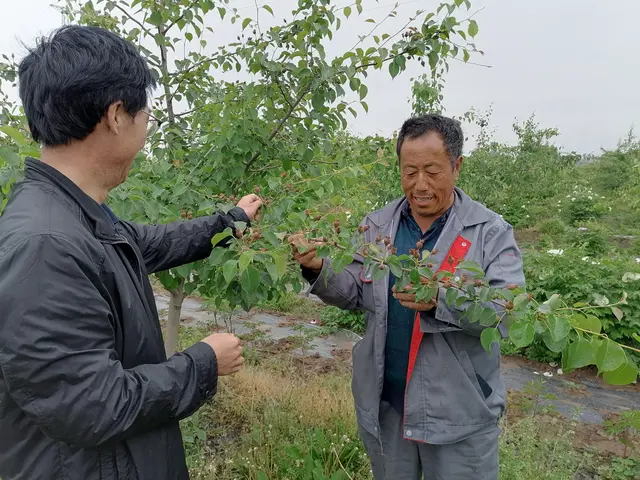As a pear planter, Cao Hui has not ventured far from his hometown in his 52 years of life, but his pears have been sold across China.
Cao lives in Hezheng County of Linxia Hui Autonomous Prefecture, northwest China's Gansu Province, and has been planting pears for over three decades.
The pear he grows is a specialty in the county, known as "Pitai pear," or Pyrus ussuriensis Maxim. It features black peel and sweet pulp, and has been grown by the local people for over a century.
Despite its unattractive appearance, the pear tastes delicious and is a hit with consumers.
For Cao, the black pear has changed his life.
When he was a child, Cao's father planted a few pear trees in their yard. Every year during harvest season, his father would peddle the pears on the street.

A pear grower is watering in the orchard. (Photo by interviewee)
In 1995, when Cao was 27, he planted many pear trees around his house just like his father, hoping the pears could help him shake off poverty.
However, it was not easy. The pear can only be stored for three months at most before it rots.
To solve the storage problem, Cao tried underground caves and sandpiles, yet they were only able to extend the pear's storage life to four months.
In 2000, he spent 1,000 yuan (about 140 U.S. dollars) -- almost his entire income for that year -- to buy a freezer big enough to hold 150 kg of pears.
Over the following two years, Cao expanded his orchard to one hectare and scraped together 70,000 yuan to build a refrigeration house.
Apart from storing his own pears, he also purchased pears from local growers to expand storage, avoiding the peak season when the price was the lowest. In 2003, he earned more than 20,000 yuan in the extended selling season.
"The high profit was a big surprise to my fellow villagers," Cao said. Many villagers decided to plant pears under his guidance.
Supported by the local government, Cao set up a cooperative and eight refrigeration houses in 2011, encouraging 360 households to grow pears.
But new problems emerged. "Without adequate planting and management knowledge, our orchard was troubled by plant diseases and pests, which inevitably led to low yields," he said.
His troubles drew the attention of the local agricultural science institution. Agricultural experts were sent to his orchard, offering him free technological support and helping him build a demonstration orchard.
With the help of experts, the yield of the orchard was doubled to 1,000 kg per mu (one hectare equals to 15 mu) in 2014. The price also doubled to 20 yuan per kg.
Cao Quanbin, 29, joined in his father Cao Hui's business after graduation, opening an online sales channel. Last year, he sold more than 1,000 kg of pears on e-commerce platforms.
To make a stable profit, Cao and his son have tried various ways to enhance the added value of the pear. Making dried pears was their first attempt to expand the value chain.
Researchers from the southern Chinese city of Xiamen have been helping Cao to extract the nutrients from the pear. They hope to develop a nutritious pear-flavored beverage, according to Guo Qingfan, deputy director with the Academy of Agricultural Sciences in Linxia prefecture.
"With experts providing professional support to us, we are more confident that we will extract more fortune from the pears," said Cao.
 简体中文
简体中文













